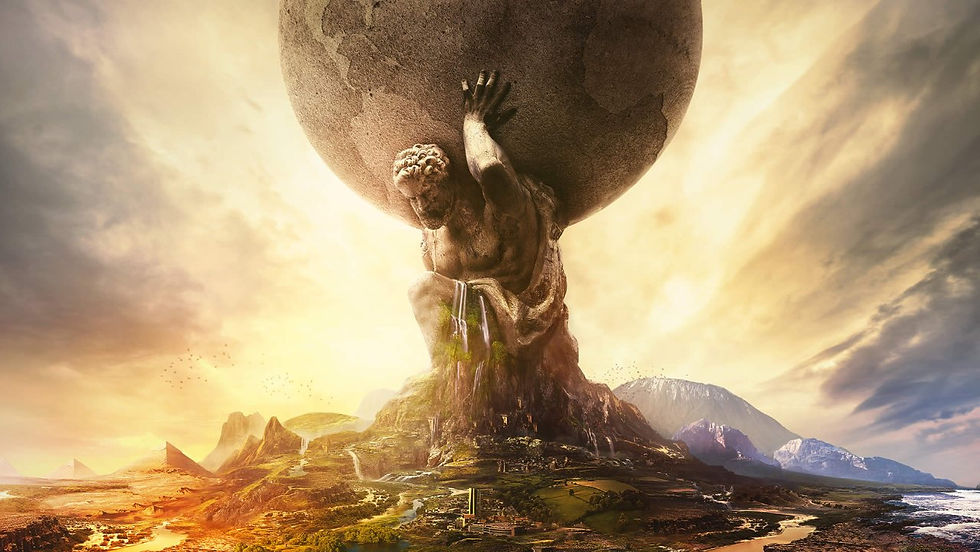
Religious Helping: Is it the Perfect Model For Society?
BY JOSHUA FLINK
o, what's the deal with this guy and the huge earth on his back? Is this a gender thing? Only men are strong? While it very well could be, it's Atlas, a Titan condemned by Zeus to stand and hold up the sky for all eternity. What a beautiful landscape, isn't it? Sorry, we're getting a bit off topic.
Religion and Homelessness.
Since the beginning of scripture, religion and religious figures have played a role in preventing their fellow men and women from experiencing poverty.
"The LORD appeared to [Abraham] by the terebinths of Mamre; he was sitting at the entrance of the tent as the day grew hot. Looking up, he saw three men standing near him. As soon as he saw them, he ran from the entrance of the tent to greet them and, bowing to the ground, he said, “My lords, if it please you, do not go on past your servant. Let a little water be brought; bathe your feet and recline under the tree" (Genesis 18:1-4).
Abraham, the father of three monolithic religions jumps to his feet at the chance to welcome a few strangers. Here, he acts as a symbol to everyone who reads the Bible that this is the standard. Not only should we welcome the stranger, the traveler, and the less-fortunate into our homes, but we should feed them, bathe them, and make them feel completely comfortable.
Thinking about this situation manifesting itself today, this seems
S
like quite a tall order, doesn't it?
What message does this convey to us? It tells us that we must act in accordance with Abraham, never rejecting a person in need, never turning a fellow human being away.
Looking ahead to Jesus, we see the Gospels communicating a slightly different message:
"And when [Jesus] had come out of the boat, immediately there met Him out of the tombs a man with an unclean spirit, who had his dwelling among the tombs; and no one could bind him, not even with chains, because he had often been bound with shackles and chains. And the chains had been pulled apart by him, and the shackles broken in pieces; neither could anyone tame him... And he cried out with a loud voice and said, 'What have I to do with You, Jesus, Son of the Most High God? I implore You by God that You do not torment me.'
For [Jesus] said to him, 'Come out of the man, unclean spirit!'" (Mark 5: 2-4; 6-8).
In this passage, how can we understand the homeless, the needy, and those that are less fortunate than us in a contemporary context? Here, we see this man overtaken by 'unclean spirits.' Could this symbolize a mental illness, a prison sentence, or even the physical stereotypes of individuals experiencing poverty today?
Unlike the passage from Genesis, this man is depicted as an outcast who needs assistance and saving. More
importantly, he needs someone to save him. Putting on our homelessness hats, this depiction feeds off the stereotype that individuals experiencing poverty are incapable of helping and 'fixing' themselves. Perhaps their situation is so horrible that they need a religious figure or a higher power or the White Man to rescue them from their anguish.
Even more disturbing in these verses is the response from the local community. Their first reaction was to bind this man, casting him off from the rest of society. While we do not physically bind the homeless population today (unless it's in handcuffs), we too enact a sort of excommunication from society. Not looking at them, not talking to them, disrespecting them etc. This lack of acknowledgment is comparable to the response of the community in the Gospel of Mark.
Often, as we can see from the two examples provided, religious scripture and, by proxy, contemporary religious organizations expect us to emulate these dramatic and heroic gestures today. However, in reality, we are far from holy figures, let alone constant model citizens.
Typically, what religion asks of us is more extreme than we can handle. Nonetheless, these scriptures point out that this type of inequality has always been a problem in society and the notion that people tolerate that inequality remains a hole in our morality.
I am not asking you to be like Abraham or Jesus or Atlas and carry the world on your back. You don't need to take in every stranger or 'cure' every person experiencing poverty. And you certainly don't have to hold up the sky for all of eternity. A middle ground exists, one which I think is a more productive and useful alternative.